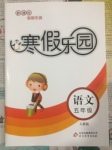题目内容
.Put the books back ________ they belong after you have finished them.
A. where B. to where C. to which D. to the place
A

 寒假乐园北京教育出版社系列答案
寒假乐园北京教育出版社系列答案One day, when I went shopping with Julie, we came across something special. Waiting in a long checkout line, I thought about going to another, which had the shortest queue. There was only one guy in it, but he was in a wheelchair. Well, we stepped in behind him. At first, he seemed to be having difficulty getting his groceries onto the checking desk. But after a while, I realized that what he was actually doing was separating them into two piles.
However, doing that job was no easy task in itself. I offered to help, but he and the checkout lady had it under control. He asked my wife if she would mind putting his empty basket away. What must it be like, I wondered, to be so dependent on other people like that? The checkout operator came around and gave him his change and the items he needed to have to hand. She hung one bag of groceries over a handle at the back of his chair. I offered to get the other, bigger, bag and he said, “No. But you could do me a favour. Take that lot along to the entrance and give it to Angela.”
As I was told, I did that, leaving Julie with our shopping. Angela, as turned out, was collecting food for people who might otherwise go hungry! I hadn't even noticed her before. This guy, despite the limitations that his physical condition imposed on him, had bought more than twice as much shopping as he needed – and given the bigger bag away to help other people! He didn't let the fact that he needed help stop him from being a help. He may have been limited physically, but his heart was more than capable of overcoming all that. And it changed my idea of dependence when I realized that the help he had given was more than the help he had received.
So … what’s holding the rest of us back?
1. From the first paragraph, we know that______.
A. the writer was obviously a disabled person
B. the man in a wheelchair was a shopper
C. the writer and Julie jumped the queue
D. only three people were shopping then
2. The man put the things he bought into two piles, probably because______.
A. his shopping bags were too small to hold all the groceries
B. he hoped to keep the balance of his wheelchair
C. he intended to help the people in need
D. it would be easy for him to carry
3. From the passage, we can learn that Angela was probably______.
A. the disabled person’s wife
B. the girl at the checking desk
C. a hungry and homeless beggar
D. a kind-hearted and helpful woman
4. Which of the following can best describe the man in the wheelchair?
A. kind, energetic and determined
B. positive, dependent and easy-going
C. active, optimistic and open-minded
D. helpful, generous and strong-hearted